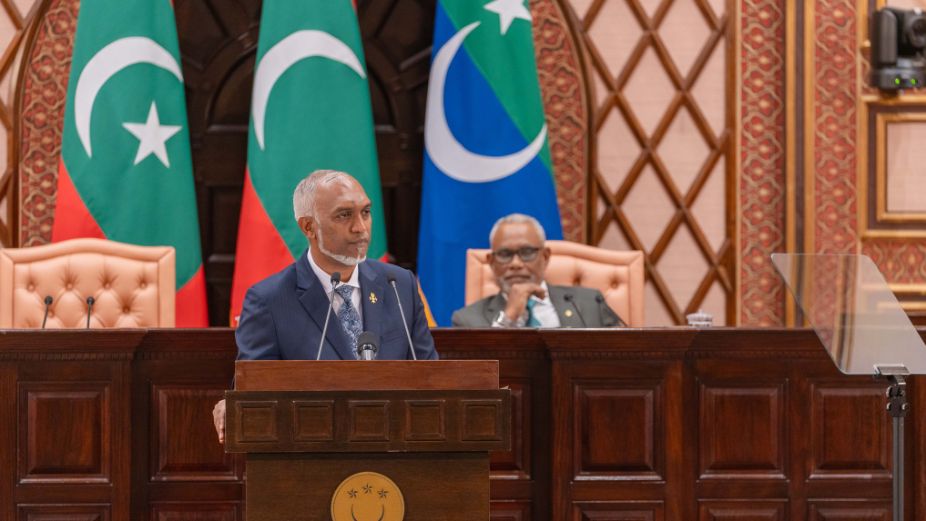
Parliament is supposed to be the nation’s forum for ideas and debate. At its best, it is the space where competing visions meet, where ideas are tested by fire before becoming law. In the Maldives today, that space has narrowed to the point of irrelevance. Debate is discouraged, dissent is a liability, and legislative work is too often reduced to procedural rubber-stamping. What was once the country’s forum for national dialogue has become, for many, a career with perks rather than a platform for ideas.
When Debate Defined the Chamber
In the mid-20th century, the People’s Majlis was not known for lively exchanges. Political decision-making had long been the domain of the palace, and public disagreement among senior officials was seen as instability. Debate was so rare that in Mohamed Ameen’s time, disagreements were sometimes handled on a boat, away from public view, so as not to alarm the public.
That began to change as Maldivians returned from studies abroad, in India, Ceylon, and Egypt. They brought back not just knowledge, but a culture of public speaking, argumentation, and critical engagement. This was not simply theatre. It was a way to clarify ideas, build consensus, and force better policy.
The 1957 debate over deporting unlicensed foreign traders stands out as a defining moment. MP Ali Ahmed introduced a bill to deport within six months all foreign traders without import–export licences. Although the motion was formally his, it was widely understood that Ibrahim Nasir was the driving force. He believed the Voras’ economic dominance trapped ordinary Maldivians in debt. Speaking forcefully, Ali Ahmed challenged fellow MPs, asking if those traders had ever truly helped Maldivians in times of hardship. He recalled instances when locals struggled to sell fish at fair prices while the Voras profited. This was a rare instance when Parliament wrestled with both economic justice and national identity.
Even those who supported the bill, like businessman Ibrahim Hassan Didi, suggested measured committee review. Nasir agreed to a review but wanted swift action. At just 29 years old, he went further, proposing that even licensed traders should be expelled if they did not meet import quotas. With strong political backing, the bill passed by 34 votes out of 37 present.
Then came the counterpunch. Prime Minister Ibrahim Faamuladheyri Kilegefaanu, who had been abroad during the vote, returned immediately and introduced a bill to annul the law. He argued that it would damage the Maldives’ foreign policy and reputation, comparing the expulsion to Hitler’s persecution of Jews. He stressed that foreign policy was the Prime Minister’s remit, and bypassing him suggested a lack of confidence in his leadership.
The clash was fierce. It was ideological, economic, and diplomatic all at once. It was also a reminder that Parliament could be a place where positions were taken, defended, and overturned through public reasoning.
From Intellectual Arena to Political Accessory
The decades that followed saw prominent literary figures, academics, and public thinkers in Parliament. Even under President Maumoon Abdul Gayoom’s long presidency, when government-aligned MPs dominated, the chamber still occasionally hosted real debate. Opposition voices were limited and often punished, but they existed. Nasheed’s banishment to an island was a stark message about the risks of dissent, yet the will to challenge persisted.
The 2008 Constitution brought structural reform and breathed new life into parliamentary exchange. During the presidencies of Nasheed, Yameen, and Solih, even when one side held a large majority, debates still served as a check on hasty legislation. The chamber had the capacity to be noisy, even unruly, but that noise was democracy at work.
That has largely evaporated. Today, with a government-aligned supermajority, debate has shrunk to technical clarifications and symbolic speeches. The very function of Parliament as a site of contest has been hollowed out.
A Chamber Obsessed with Its Own Comfort
The problem is not just a lack of debate. It is a drift toward monetisation and personal security. Parliament’s own records recently revealed that more than 90 percent of MPs have completed fewer than five works this term. The average is under three per member. On paper, this is one of the least productive parliaments in living memory.
Yet MPs have found time to raise their own financial concerns. The current pay structure offers a basic salary of MVR 42,500, a living allowance of MVR 20,000, and a committee allowance of MVR 20,000. Some MPs say this does not reflect the cost of living in Malé, where rents for a modest three-bedroom apartment can exceed the living allowance. Several have suggested revisiting allowances and salaries. The juxtaposition is hard to ignore: a Parliament with little legislative output investing its energy in discussing its own pay.
It is not that MPs should not be paid well. Healthy democracies compensate legislators fairly to protect independence and reduce susceptibility to corruption. But when career survival eclipses legislative purpose, Parliament risks turning into a get-rich scheme with ceremonial duties attached.
Why Debate Cannot Be Optional
History makes one thing clear: the Maldives’ most important legislative decisions have come when Parliament was alive with disagreement. The reversal of the Vora deportation, the debates over national assets, the arguments over constitutional change, all of these moments were defined by the friction of ideas.
A supermajority is not inherently bad. It can pass urgent laws quickly and deliver policy efficiently. But without meaningful opposition or dissent, efficiency becomes recklessness. The role of debate is not to slow government for its own sake, but to ensure that laws are interrogated, that unintended consequences are spotted, and that citizens see their representatives working on their behalf.
When Parliament ceases to be the nation’s argument, it becomes the nation’s echo. And an echo, however loud, never changes the shape of the room.












